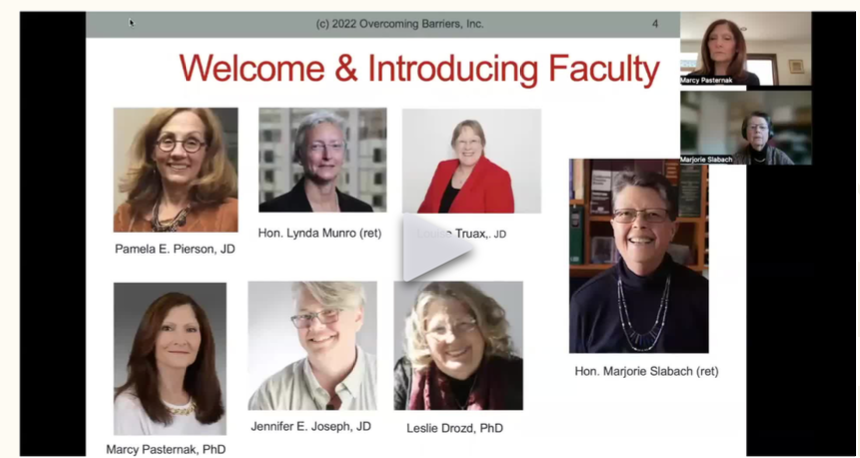Overcoming Barriers in collaboration with William James College is pleased to announce a new
online multi-module course entitled,
What to Do When a Child(ren) Rejects a Parent: A Toolkit for Judges and Attorneys
Course fee: $600
Program Summary:
Some of the most difficult cases we face occur when a child resists or refuses contact with a parent. In these cases, conventional wisdom typically does not work. This multi-module online course provides an overview of why these “resist/refuse” cases are different, what makes them so challenging, and the tools every family law professional needs to be able to deal with them more effectively.
A multi-disciplinary expert team of two judges, three attorneys, and two mental health professionals will discuss the following themes: Why a whole-family approach is necessary; Why a provider “team” is necessary; How team members can work together effectively and within the confines of their ethical obligations; and Why time is of the essence.
Building on these themes we take a closer look at the different components of the practitioner’s tool-kit for cases in which a child resists or refuses contact with a parent.
These offer practical tips and strategies for dealing with these cases, including:
-
-
- Identifying Red Flags
- Building an effective team to work with the whole family
- What therapist/s can (and cannot) do in these cases
- Working with opposing counsel
- Attorney’s work with clients
- Engaging the Judicial Officer
- Developing effective service agreements and court orders as well as measures of accountability; and
- What to do when a case involves domestic abuse or trauma
-
In addition to didactic education the team will present scenarios that reflect common situations encountered in these cases and will provide a dynamic and interactive “practice” for the professionals of what they’ve learned and best practices in determining severity of RRD and what to do in each situation. Experts discuss how easily this issue can develop in a family, the usefulness of custody evaluations, the use of social science in court cases, when and how for a parent to say goodbye to a child and other special, relevant topics in addition to the content curriculum.
This program is recommended for all levels of professionals working with complex family dynamics and situations.
Learning Objectives:
-
-
- Describe the continuum of parent-child contact problems, from alignment to estrangement to alienation.
- Identify and examine the multiple factors that contribute to the development, maintenance, and exacerbation of resist-refuse dynamics within the family system.
- Distinguish cases involving alienation from cases in which resistance is the result of other causes.
- Develop and employ judicial and legal resources to support a systemic response to resist-refuse cases.
- Integrate clinical and educational interventions into judicial and legal responses.
- Facilitate interdisciplinary collaboration among clinicians, attorneys, and judicial officers to provide coordinated systemic support (and accountability) to families experiencing resist-refuse dynamics.
- Determine when efforts to enforce contact between a child and rejected parent should be suspended.
-

